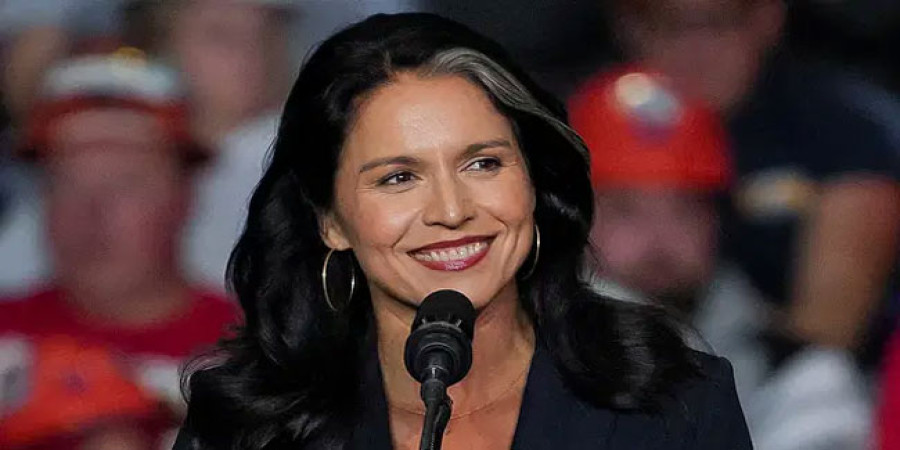
ছবি: U.S. Officials Concerned About Tulsi Gabbard's Nomination as National Intelligence Director - Photo: Collected
A group of 100 former U.S. diplomats has expressed concern over Tulsi Gabbard, the former presidential candidate and Hawaii representative, being nominated as the Director of National Intelligence (DNI) in the Trump administration. In an open letter, the diplomats criticized Gabbard’s alleged sympathies for authoritarian leaders like Russian President Vladimir Putin and Syrian President Bashar al-Assad, and questioned her qualifications for the crucial intelligence role.
The diplomats argue that these concerns warrant a closed-door meeting in the Senate for a thorough review of her qualifications. They claim Gabbard's past actions and positions, including her meeting with Assad and her controversial views on Russia’s military activities, make her a questionable candidate for the position.
The letter pointed out Gabbard's lack of intelligence experience and her apparent embrace of conspiracy theories, particularly regarding Russia’s military actions in Ukraine and the Syrian government’s use of chemical weapons. Her history of questioning these established facts and her connections with Russian and Syrian officials have raised alarms among those who have worked in U.S. foreign policy and intelligence.
Among the signatories of the letter are prominent former officials, including Wendy Sherman, the former Deputy Secretary of State, Rose Gottemoeller, former Deputy Secretary General of NATO, and Anthony Lake, the former National Security Advisor. Several former ambassadors, intelligence officers, military personnel, and other high-ranking individuals also added their names to the letter, which was addressed to Senate Majority Leader Chuck Schumer and Senate Minority Leader Mitch McConnell.
The diplomats urged the Senate to fully exercise its constitutional role and ensure that Gabbard’s qualifications are properly scrutinized. They specifically called for a closed Senate session to review "all available information" regarding her abilities to protect U.S. intelligence sources and methods.
This criticism of Gabbard’s candidacy follows her longstanding positions on foreign policy, which have often set her at odds with both her political opponents and certain factions within the U.S. foreign policy establishment. She has been a vocal critic of U.S. military interventions, particularly in Syria and Ukraine, which has led some of her political rivals to accuse her of being overly sympathetic toward U.S. adversaries.
Supporters of Gabbard, however, have dismissed these concerns as politically motivated. They argue that her stance on non-interventionism and her calls for diplomatic engagement with countries like Syria and Russia are based on her belief in a more restrained and thoughtful U.S. foreign policy. Gabbard has previously defended her meetings with Assad, calling them part of an effort to understand the situation on the ground, and she has repeatedly rejected the idea that she supports authoritarian regimes.
Despite these defenses, many in Washington remain wary of Gabbard’s approach to international relations. Her recent statements and actions, such as her criticism of the killing of Iranian General Qasem Soleimani and her claims about U.S. biological labs in Ukraine, have fueled concerns that she might not be the right fit for a role overseeing the nation’s intelligence apparatus.
U.S. intelligence officials and diplomats have raised specific concerns about Gabbard’s stance on key issues. For instance, while there is clear evidence that Assad’s government has used chemical weapons against civilians, Gabbard has publicly questioned the veracity of these claims. Similarly, her statements about Ukraine’s alleged role in biological weapons production and her criticism of NATO’s involvement in the region have put her at odds with mainstream U.S. foreign policy.
Critics argue that Gabbard’s views could undermine U.S. intelligence efforts, particularly in regions where American interests are directly threatened by Russian and Syrian actions. Her sympathies for these leaders have led some to question her judgment and qualifications for overseeing the U.S. intelligence community.
One anonymous source with knowledge of high-level intelligence discussions revealed to The Guardian that there are growing concerns within the U.S. government regarding Gabbard’s interactions with foreign leaders, particularly in the Middle East. This source noted that Gabbard’s relationships with key figures in the region, such as Assad, have raised doubts about her ability to make unbiased and informed decisions as DNI.
In response to the criticisms, Gabbard’s supporters have reiterated that her foreign policy positions are grounded in her commitment to peace and diplomacy, rather than any ideological alignment with authoritarian regimes. They argue that she is a pragmatist who seeks to prevent unnecessary U.S. involvement in conflicts abroad.
As the debate continues, the Senate is expected to review Gabbard’s nomination carefully. While it remains uncertain whether she will ultimately be confirmed as DNI, her candidacy has already sparked a broader conversation about U.S. foreign policy, intelligence practices, and the qualifications necessary to lead the nation’s intelligence community.
This ongoing controversy highlights the tension between Gabbard’s vision for a less interventionist U.S. foreign policy and the concerns of those who believe that such an approach could be detrimental to national security and global stability.
repoter






